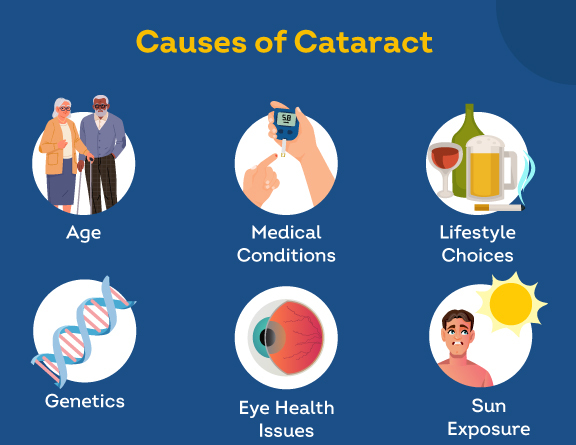
Select City
Subcapsular cataract surgery is a highly effective treatment for posterior subcapsular cataracts (PSC), a specific type of cataract that forms at the back of the lens capsule. This condition can drastically impact your vision, causing symptoms such as blurred vision, glare, and difficulty seeing in bright light conditions. With several surgical approaches available, a tailored treatment plan can be created to suit your circumstances. Consult with an expert ophthalmologist at Pristyn Care today and let us guide you toward clearer vision. Book your appointment now.
Subcapsular cataract surgery is a highly effective treatment for posterior subcapsular cataracts (PSC), ... Read More




Free Consultation

Free Cab Facility

No-Cost EMI

Support in Insurance Claim

1-day Hospitalization

USFDA-Approved Procedure
Subcapsular cataract surgery is a procedure performed to treat PSC. These cataracts develop at the back of the lens capsule and can significantly impair vision by causing symptoms like blurred vision, glare, and difficulty seeing in bright light conditions. The procedure is carried out by an ophthalmologist, on an outpatient basis, meaning you won’t need to stay in the hospital post-surgery.
During this procedure, the cloudy lens that is obscuring your vision is carefully removed and replaced with an artificial intraocular lens (IOL). The entire process usually takes less than an hour and has a high success rate, offering patients a safe and effective solution to restore their vision.

Fill details to get actual cost
If you are experiencing symptoms such as blurred vision, light sensitivity, or difficulty seeing in low light, you might need to undergo a comprehensive eye examination to diagnose PSC. Here are a few steps that your doctor might follow:


Subcapsular cataract surgery is a nuanced procedure, requiring meticulous attention. Here is what you can expect from it:
Whether you are the right candidate for subcapsular cataract surgery is decided by your ophthalmologist after considering your symptoms, visual impairment, and how it is impacting your daily activities. Some of the common criteria include:
Diet & Lifestyle Consultation
Post-Surgery Follow-Up
Free Cab Facility

24*7 Patient Support
The primary advantage of undergoing subcapsular cataract surgery is the restoration of vision clarity. Here are some benefits you can expect from this procedure:
Before you undergo subcapsular cataract surgery, you need to do some preparation. Here’s what it involves:
Recovering from subcapsular cataract surgery largely involves following doctor’s instructions and taking care of your eyes. These recovery tips can help:
Avoid Eye Rubbing: Resist touching or rubbing your eyes to prevent irritation or dislodging the intraocular lens.
Like any surgical procedure, subcapsular cataract surgery too comes with potential risks or complications, including:
Discussing the cost of subcapsular cataract surgery in India, it’s important to start with the clarification that the costs can vary greatly. This wide range is due to several factors, including the type of surgery performed, the hospital where the surgery is performed, and its location. Though it’s not easy to pinpoint a specific figure, let’s shed some light on the factors that can affect the posterior subcapsular cataract surgery cost:
In India, many health insurance policies generally cover subcapsular cataract surgery. This means that you can alleviate a significant chunk of your surgical expenses through your insurance coverage. However, it’s important to recognize that this coverage is often subject to certain terms and conditions. Here are some of them:
Typically, subcapsular cataract surgery is performed as an outpatient procedure and is usually completed within one to two hours. The actual operation time might be as short as 15 minutes, but you should plan for recovery and pre-surgery preparations.
Most people begin to notice an improvement in their vision almost immediately after the operation, but full recovery can take several weeks. Your doctor will provide you with a detailed recovery plan.
Yes, you can Subcapsular cataract surgery is often performed on an outpatient basis, which means you’ll likely go home on the same day once your doctor confirms there are no immediate complications.
The posterior subcapsular cataract surgery cost varies depending on factors such as the hospital, surgeon’s fee, and any additional treatments needed. It’s advisable to consult with your doctor or insurance company for the most accurate estimate.
Though rare, potential complications could include inflammation, infection, bleeding, swelling, retinal detachment, or changes in eye pressure. However, these are extremely rare and your doctor will take precautions to minimize any risks.
It varies from person to person. Some may still need glasses for certain activities like reading or driving especially if they had astigmatism or presbyopia before the operation.
Return to work depends on the nature of your job. For jobs that don’t require heavy physical activity, you could expect to be back at work within a week. However, for more physically demanding jobs, you might need to wait a bit longer.
Subcapsular cataract surgery has a high recovery and success rate. Approximately 90% of patients experience an improvement in their vision following the procedure.
Yes, but it’s critical that you inform your doctor about any other eye conditions you have, as some may affect surgical procedures or recovery.
No specific diet is required post-surgery. However, maintaining a healthy diet can promote overall eye health and contribute to a faster recovery.